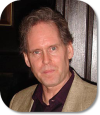JCC & TDQ
August 2015
My first thought was, “Why is Ronnie Wood at The University Women’s Club in Mayfair?” But then I quickly realized it wasn’t Ronnie Wood. It was instead the man I was waiting to speak to: Dr John Cooper Clarke, the punk poet from Salford who toured in the late 1970s with The Sex Pistols and The Clash, and who in 1983 released a bestselling book of poetry, Ten Years in an Open Necked Shirt. Those achievements, however, came before a heroin addiction overtook him. But he kicked that habit long ago, and in recent years has roared back with brand-new material, a great live show, and a host of new projects, including a commission from the National Trust to write verse in praise of the British coastline.
In preparing for my interview with Dr Clarke, I had of course read of his resemblance to Ronnie Wood, but it still caught me by surprise. I was nervous. Dr Clarke is the host of a forthcoming episode of the BBC Four programme The Secret Life of Books. In its first iteration, the show featured episodes on Mary Shelley’s Frankenstein, Charlotte Brontë’s Jane Eyre, Charles Dickens’s Great Expectations, and Virginia Woolf’s Mrs Dalloway, among others. Dr Clarke’s show – part of the second series – is devoted to the nineteenth-century English essayist and opium addict Thomas De Quincey, and specifically to his most famous work Confessions of an English Opium-Eater, the first modern account of drug euphoria, addiction, and relapse. Dr Clarke and I were meeting that morning in Mayfair to discuss De Quincey.
How was this interview going to go? I was hoping of course that we would be able to develop some sort of rapport that would produce an interesting and informative conversation once the cameras were on. But it wasn’t immediately clear to me how that rapport might develop in the ten minutes or so before we started to shoot. Dr Clarke was ushered over to where I was standing. He introduced himself, and we sat down across from one another at a table whilst the cameraman and director prepared to film. There was a slight pause. We knew we were there to talk about De Quincey, but where to start? Then Dr Clarke looked up and said, “Paul Anka. Paul Anka’s Canadian”.
Did I hear that right? Did he just say “Paul Anka”? – Canada’s first pop idol, and a rival briefly to Elvis with hits from the late 1950s such as “Diana”, “Put Your Head on my Shoulder”, and “Puppy Love”. I know – as it happens and much to my relief in this instance – quite a bit about Paul Anka, as my aunt was a big fan. I remember listening to her collection of his singles (“45”s), and talking to her about him. “Yes”, I replied. “Yes, Paul Anka is Canadian. In fact, I crossed ‘Paul Anka Drive’ on my way to the Ottawa airport about eighteen hours ago. Anka was born and raised in Ottawa”. “I know”, Dr Clarke nodded. “I just finished reading his biography”. Another brief pause. “What’s Paul Anka’s greatest song?” he asked. Thankfully I didn’t think. I just said immediately, “‘Lonely Boy’…‘Lonely Boy’ is Paul Anka’s greatest song”. “…Is the right answer!” he exclaimed. And with that we were off.
Canadian pop music. British pop music. Canada. Britain. Poetry. Living in Britain in the 1980s. Manchester and Liverpool. London streets. Bookshops. Books. The Secret Life of Books. Thomas De Quincey. We were ready to go at about the same time as the cameras came on. Dr Clarke asked me a wide-ranging series of questions about De Quincey. When did he start taking opium? How did he take it? Why did he take it? What effect did it have on him? On his writing? On his relationships with family, friends, and publishers? The drug was legal when De Quincey consumed it: what difference did that make? He invented recreational drug taking: what, exactly, did that mean? And so on. We chatted for close to an hour. It was one of the most interesting and evocative discussions of literature – and of the ways in which literature shapes our perceptions and misperceptions – that I’ve ever participated in.
The show is now finished and I’ve recently had the pleasure of a quick preview. It has come out wonderfully well. Dr Clarke does a superb job, not just of hosting the programme, but of casting his own unique light on the implications and influence of De Quincey’s Confessions, as well as on the literature of addiction more broadly conceived. The show airs on BBC Four this autumn.


